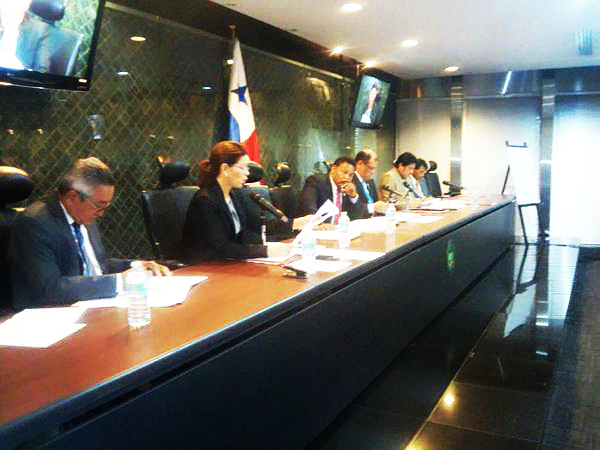
Proposal would finance local governments through nationally controlled property taxes
Committee approves decentralization lite
by Eric Jackson
The National Assembly’s Municipal Affairs Committee has had its whack at a decentralization law sent to it by President Varela. It chopped out sections that could be construed to allow local governments to reassess real estate values for the purpose of property taxes, and on October 8 passed the proposed law on to the full legislature. The committee vote was unanimous. More amendments could still be made.
The Martinelli administration had threatened a property tax reassessment plan that was not about correcting the gross discrepancies in assessed values that favored rich neighborhoods but about using taxes to force the sale of certain areas to Martinelli’s speculator friends. That move did much to set the business community against Martinelli and assure his 2014 defeat.
The possibility of a new version of such a plan was raised by committee chair Javier “Patacón” Ortega (anti-Robinson PRD from Panama City) and by deputies accusing Ortega of weakness in the face of such a threat. For his part President Varela protested that it was never his intention to raise anyone’s property taxes. At this point we have a decentralization proposal that would transfer certain responsibilities to municipalities but leave municipal finance largely under the national government’s control.
A bit of history is in order to understand decentralization in Panamanian government and its various failures. The basic points of departure are the October 11, 1968 coup d’etat, the 1972 constitutional convention and the December 20, 1989 US invasion. The old Guardia Nacional would set limits on what the politicians could do between the 1941 overthrow of Germanophile Arnulfo Arias shortly before US entry into World War II and the seizure of power from Arnulfo Arias in 1968. In the 40s, 50s and 60s many things were tried, few of them systematically thought out or particularly enduring. With the possible exceptions of Arias and his nemesis General Remón — who became President Remón and was then assassinated — it was a government of squabbling cousins looking for momentary and usually pecuniary advantage, with the Guardia and sometimes the US Embassy as referees.
Is there such an ideology as “Torrijismo?” When Guardia officers led by Omar Torrijos and Boris Martínez seized power, they were mainly concerned about Arnulfo Arias’s intentions to disrupt their lives by altering the seniority system and thus their places in line to be promoted. It can reasonably be said that Torrijos shared some ideas pioneered by Remón, a modestly social reforming militarism that would not much upset the Americans. Remón did, for example, open up the officer corps to young men from humble backgrounds and eliminate some of the racial prejudice that had kept senior civil service and diplomatic posts largely in the hands of members of Panama’s white minority.
But the officers who took power in 1968 didn’t have much of a plan other than their places in the promotion line. Infighting that sent Martínez into exile and raised the profile of intelligence chief Manuel Antonio Noriega altered that list anyway, as Torrijos assumed control. Torrijos did care about his place in history and determined to oversee the transfer of the Canal Zone and the Panama Canal to Panama. For this purpose he offered various deals. To those sectors of the left and the labor movement that would accept it, he offered relief from the old repression and exclusion and passed a labor code that effectively legalized unions. He was quite brutal to the radicals who didn’t play along — more than 100 were killed or disappeared over the 21 years of the dictatorship. To business sectors that would play along he offered some new opportunities, sometimes at the expense of those who didn’t play along.
To negotiate with the Americans it was convenient for General Torrijos to have some semblance of constitutional rule and for this he called the representantes — more or less city council members — who had been elected in 1968 to a convention. This 1972 gathering drafted our current constitution to military specifications. It was essentially a political patronage deal — the offer to the representantes was to accept the military command as the true power and in exchange see their rank and prestige restored and receive some money to spread around among their constituents. As it was a deal with the lowest level local officials it was inherently decentralizing to that extent. Real power, though, particularly the power to tax and to distribute the proceeds, remained with the national government that was under military control.
After the Panama Canal treaties were enacted and began to be implemented, more resources became available to dole out to local officials. After Torrijos died, Noriega forced his way to the top and relations with the United States soured. Sanctions were imposed and during those years there were few benefits to be shared with local officials.
Come the invasion and Panama was prostrate. A reasonably honest but bumbling President Guillermo Endara was surrounded by an entourage that included a lot of people who figured that it was their turn to steal. It was a time of chaotic turf battles, crumbling public services and the atomization rather than diminution of corruption. An attempt at major reform of the dictatorship’s constitution failed. Since Endara’s time the general trend in all administrations until the current one has been toward centralizing both political patronage and public corruption in the executive branch.
We had two “ghost presidencies” — people who voted for Arnulfo Arias’s much younger widow Mireya Moscoso expecting Arnulfo and got far less, then people who voted for Omar Torrijos’s son Martín Torrijos expecting Omar and got a president neither so brilliant nor so complex as his father.
As the Martín Torrijos administration approached its end, what did the US-educated son of the general who is a nationalist icon to many Panamanians do? He and his party passed a lame duck decentralization law based on perhaps the most dysfunctional aspect of the US political system, local government financed by property taxes.
The incoming Martinelli administration quickly suspended that law for its duration. Ricardo Martinelli intended to aggrandize himself and perpetuate himself in power, largely by concentrating all public contracting in his hands on a no-bid basis with overcharges and kickbacks to himself, his minions and his political slush funds. When the crudely corrupt and not too competent Bosco Vallarino attempted to grab a bit of the action by rigging garbage truck purchases through the Panama City mayor’s office, Martinelli promptly marginalized and then deposed him.
Those years over, Martinelli has fled the country and Vallarino is under house arrest. Varela has revived the promise of decentralized government. But as presently amended, the powers of local governments to raise money come nowhere close to meeting the costs of the responsibilities that they will be expected to take on. It may also be the case that, due to promises made to alleviate real fears of people being forced out of their homes by higher property tax bills that they can’t afford, a set of tax assessments that bears little resemblance to market values will be frozen into place for some time to come. However, that situation may not be sustainable in the face of a slowing national economy and frequent warnings by international financial institutions that Panama needs to collect more taxes.









